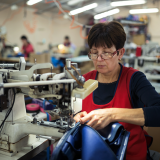
Darbo santykiai ir socialinis dialogas
Darbo santykiai ir socialinis dialogas yra viena iš šešių pagrindinių EUROFOUND 2021–2024 m. darbo programoje numatytų veiklų. EUROFOUND tęs veiklą kaip ES lygmens ekspertinis centras darbo santykių sistemų ir socialinio dialogo raidos stebėjimo ir analizės srityje. EUROFOUND ir toliau rems administracijos ir darbuotojų dialogą, atsižvelgdamas į COVID-19 poveikį ir remdamasis EUROFOUND nacionalinio lygmens korespondentų tinklo sukauptomis žiniomis.
Per ateinančius ketverius metus EUROFOUND pateiks svarbių įžvalgų, susijusių su iššūkiais ES darbo santykių ir socialinio dialogo srityse bei šių sričių ateities perspektyvomis. Sukaupęs ilgametę praktinę patirtį šioje srityje, EUROFOUND nagrinėja pagrindinius pokyčius, kurie daro poveikį darbo santykių dalyviams, procesams ir pagrindiniams rezultatams. Jis lygina nacionalines darbo santykių sistemas, įskaitant nacionaliniu lygmeniu vykstantį socialinį dialogą ir kolektyvines derybas . Remdamasis savo 2020 m. sukurtos „COVID-19 EU PolicyWatch“ duomenų bazės informacija, EUROFOUND stebės vyriausybių, socialinių partnerių ir kitų dalyvių vykdomas politikos iniciatyvas, kuriomis siekiama sušvelninti socialines ir ekonomines krizės pasekmes bei remti atsigavimo pastangas. Bus toliau rengiamos EUROFOUND reguliariai teikiamos ataskaitos apie pokyčius atlyginimo nustatymo, minimalaus darbo užmokesčio ir darbo laiko ;srityje, taip pat apie profesinio gyvenimo rezultatus.
EUROFOUND praktinė patirtis padeda socialiniams partneriams didinti pajėgumus, siekiant veiksmingo socialinio dialogo, taip pat agentūra skatina Europos socialinio dialogo vystymą, vertindama socialinių partnerių organizacijų atstovavimą skirtinguose sektoriuose, taip siekdama įvertinti jų tinkamumą dalyvauti socialinio dialogo komitetuose.
- Infografikas: Darbo santykiai ir socialinis dialogas ES
„Esame čia tam, kad remtume administracijos ir darbuotojų dialogą. Ir manau, kad duomenys, kuriuos kartu surenkame, ir tyrimai, kuriuos vykdome , yra svarbūs, jei jie padeda geriau dirbti patiems darbo santykių dalyviams... Tvirtas socialinis dialogas yra vadinamosios socialinės rinkos ekonomikos, kurios siekia Europos Sąjunga, dalis.“
David Foden, darbo santykių konsultantas


































